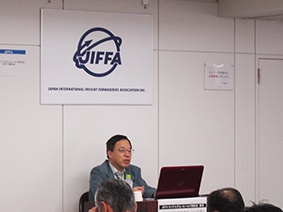News
Japan International Freight Forwarders Association Inc. (JIFFA) on Monday, July 22 held a briefing session on study results put into shape by its Rotterdam Rules (RR) Committee which was set up in January last year in preparation for the possible enforcement of the UN Convention on Contracts for the International Carriage of Goods Wholly or Partly by Sea, known as the Rotterdam Rules.
The newly created committee convened a total of 16 meetings from January in 2012 through May 2013, providing insights into likely impacts on the JIFFA Multimodal Bill of Lading (JIFFA MT B/L), from the standpoints both as a freight forwarder which dispatches shipments via a common carrier and books space for the shipments on behalf of shippers, and as a shipper in its relationship with an ocean common carrier.
In addition, Rotterdam Rules Committee members visited China, Hong Kong and Korea from Feb. 25 to March 1 this year to exchange views and information with more than 10 local organizations, including a university, law firms, a maritime law association, a maritime arbitration commission and forwarders associations as well as TT Club in Hong Kong.
At the briefing session on Monday, Mr. Shuji Yamaguchi, who leads the committee and is an attorney at law from Okabe & Yamaguchi, a Tokyo-based legal office, gave a presentation on the results of their series of considerations.
When the new convention is ratified, International Conventions and Protocols for the Unification of Certain Rules of Law relating to Bills of Lading and the United Nations Convention on the Carriage of Goods by Sea that have been signed since 1924, such as so called the Hague Rules, the Hague-Visby Rules and Hamburg Rules, will all be repealed, said Mr. Yamaguchi. As the rules will enter into effect a year after 20 countries have ratified, NVOCCs and other relevant parties will all need to make thorough preparations in very limited time, he added.
Mr. Yamaguchi also gave a briefing on how the Rotterdam Rules, which were adopted in 2008 by the United Nations Commission on International Trade Law (UNCITRAL), are different from the existing Hague-Visby Rules.
He called attention to some aspects of the new rules. Under the new regime, the rules will be applied to a JIFFA member company regardless of Japan’s ratification, if either the place of receipt, the port of loading, the place of delivery or the port of discharge described on a B/L issued by the member company is located in a country that has ratified the rules, he said.
He also clarified the differences with the current rules. The carrier shall liable for the negligent navigation and fire. The shipper is liable to the carrier for loss or damage resulting from failure to inform the nature or character of dangerous goods. The limits of carrier’s liability are increased and the carrier is liable for loss caused by delay. As between the Maritime performing party and the NVOCC, the liability of the Maritime performing party may be lesser than the one of the NVOCC under the volume contract, thus the NVOCC’s liability for the shipper may be greater.
Mr. Yamaguchi explained that as of June 1, 2013, the Rotterdam Rules had been signed by 24 governments and ratified by two, meaning that the requirement had not been met yet. However, media reports said that the U.S., one of the 24 signatories, has begun working to ratify the Rotterdam Rules, while in Denmark, the local maritime law association is urging Copenhagen to ratify them.
If the nine European Union (EU)-affiliated nations that have signed the Rotterdam Rules ratify them following Spain, one of the two ratifiers, it is expected that the other signatories may follow suit.
In preparation for the enforcement of the new regulations, JIFFA will defensively consider taking various measures, including a revision on the JIFFA MT B/L.









